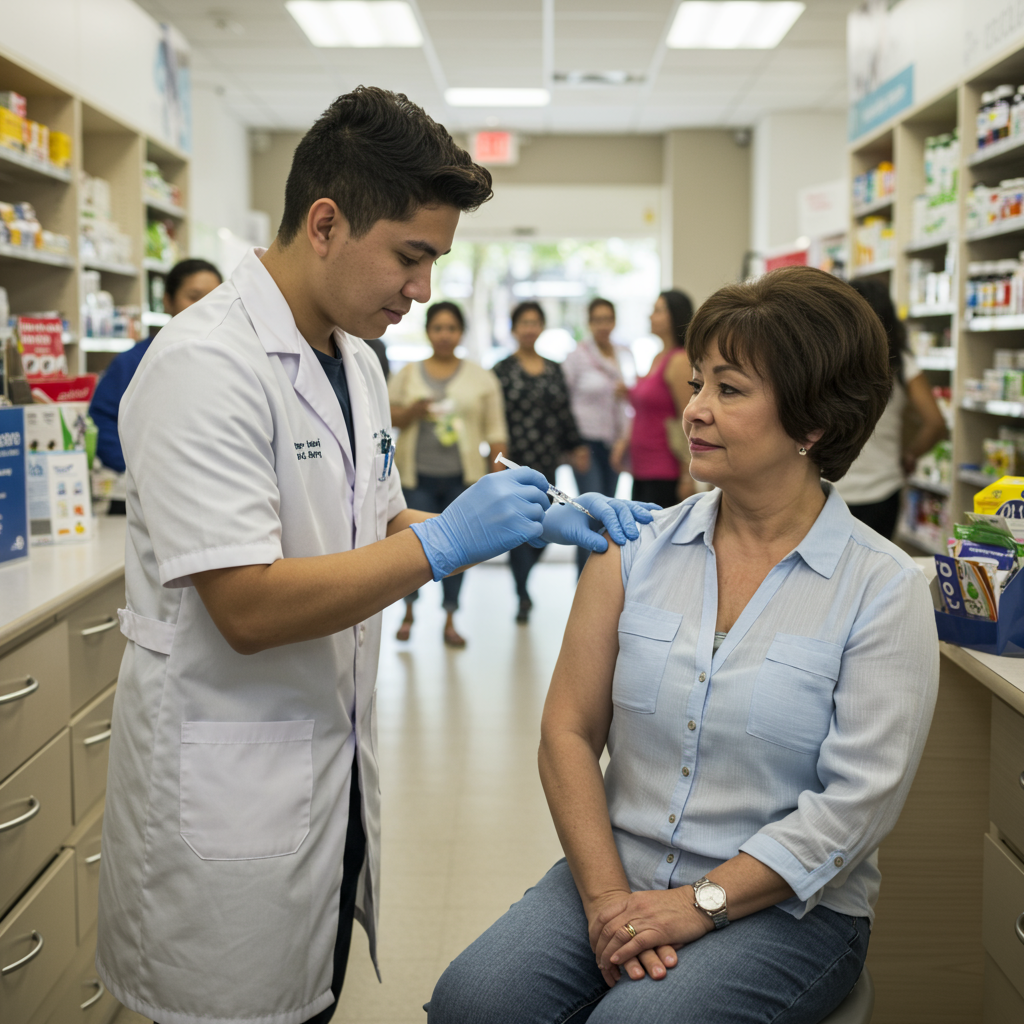Annual influenza vaccination is a cornerstone of public health. It significantly reduces illness and bolsters community-wide immunity. Beyond individual protection, flu shots create a collective shield against seasonal outbreaks. Pharmacists are emerging as vital partners in this effort. Their accessibility and expertise are transforming how people get vaccinated. This article explores the profound benefits of flu vaccination. It highlights the critical role pharmacists play in fostering a healthier community.
The Unrivaled Power of Flu Vaccination: Protecting Everyone
Influenza, commonly known as the flu, is a highly contagious respiratory illness. It can lead to severe complications, hospitalization, and even death. The flu season typically runs from October to May. Peak activity often occurs between December and February. Preventing its spread is crucial, especially in a world grappling with other respiratory viruses.
Direct Protection: Your First Line of Defense
Getting a flu shot is the most effective way to protect yourself. The vaccine prompts your immune system to create antibodies. These antibodies fight off the virus. Studies consistently show that vaccination reduces your risk of contracting the flu. Even if you do get sick, the vaccine lessens symptom severity. It significantly lowers the chances of serious complications. For instance, vaccinated adults face a lower risk of ICU admission. They also experience a reduced risk of flu-related death. Children who receive flu shots have a dramatically reduced risk of hospitalization. Their emergency department visits also decrease substantially.
Safeguarding Everyone: The Ripple Effect of Community Immunity
The benefits of flu vaccination extend far beyond the individual. Widespread immunization builds “community immunity,” often called herd immunity. When enough people are vaccinated, the virus struggles to spread. This protects vulnerable populations who cannot receive vaccines. These include infants under six months or individuals with certain medical conditions. Even unvaccinated community members benefit measurably from this indirect protection.
Advanced modeling studies underscore this effect. Simulations reveal that vaccination campaigns significantly influence immunity dynamics. Even with moderate vaccine effectiveness, a substantial percentage of flu cases are averted across the population. Prioritizing vaccination in children, for example, dramatically reduces overall influenza transmission. This reinforces the powerful concept of collective protection. However, it’s vital to note that if transmissibility rates become exceptionally high, indirect protection can diminish. In such scenarios, additional measures like masking and social distancing become essential.
Pharmacists: Accessible Experts Driving Public Health
Pharmacists are increasingly recognized as pivotal healthcare providers. Their strategic position within communities makes them ideal for expanding vaccine access. They are more than just dispensers of medication. They are trusted educators and skilled immunizers.
Beyond the Counter: Expanding Access & Convenience
Community pharmacies are highly accessible locations. They eliminate common barriers to vaccination. Long waits, complex appointment scheduling, and transportation issues are reduced. Pharmacists offer flexible hours, making it easier for busy individuals to get vaccinated. Many pharmacies host dedicated immunization clinic events. Programs like “Shots on the Spot” bring vaccines directly to workplaces, schools, and retirement homes. This innovative model provides unparalleled convenience. For businesses, hosting such clinics can reduce employee sick days and boost productivity. These initiatives streamline the vaccination process, benefiting everyone involved.
Building Trust Through Education and Personalized Care
Pharmacists play a critical role in patient education. They explain the importance of vaccination. They clarify both the personal and community-wide benefits. This personalized approach fosters greater patient satisfaction. It builds stronger relationships within the healthcare system. Surveys show high patient satisfaction with pharmacist-administered flu shots. Many patients even state they would not have sought vaccination if not for the convenience of pharmacy offerings. This underscores pharmacists’ unique ability to overcome vaccine hesitancy. Their consistent outreach and clear communication increase vaccine acceptance.
The Economic and Societal Impact
The expanded role of pharmacists in vaccination efforts yields significant economic benefits. Integrating pharmacies into flu campaigns prevents millions of illness cases. It generates substantial healthcare savings and productivity gains. Economic analyses project billions in averted costs and increased workforce output. Advocacy groups consistently highlight the high societal value of pharmacy-based immunization. Their contributions are essential for mitigating seasonal flu outbreaks and enhancing overall public health outcomes.
Comprehensive Flu Prevention Strategies
While vaccination is the most crucial step, a multi-faceted approach offers the best protection against influenza. Combining a flu shot with good hygiene and other healthy habits creates a robust defense.
Beyond the Needle: Everyday Hygiene Habits
The flu virus is highly contagious. It spreads primarily through respiratory droplets. These are expelled when an infected person coughs, sneezes, or talks. Less commonly, it can spread via contaminated surfaces. Simple hygiene practices can significantly curb its transmission:
Avoid Close Contact: Stay home when you are sick. Keep a distance from others who are unwell.
Cover Coughs and Sneezes: Use a tissue, then dispose of it immediately. If no tissue is available, cough or sneeze into your elbow.
Frequent Hand Washing: Wash your hands often with soap and water for at least 20 seconds. Use an alcohol-based hand sanitizer (at least 60% alcohol) if soap and water are unavailable.
Avoid Touching Your Face: Do not touch your eyes, nose, or mouth with unwashed hands. This prevents germ transfer.
Clean and Disinfect Surfaces: Regularly clean and disinfect frequently touched surfaces at home, work, and school.
Studies show that combining hand hygiene with mask-wearing can significantly reduce the spread of flu-like symptoms.
Supporting Your Natural Defenses
A healthy immune system is your body’s best defense against infections. While your immune system generally regulates itself, certain lifestyle choices can support its function:
Nutrient-Rich Diet: Consume plenty of fruits, vegetables, and whole grains. These provide essential vitamins and minerals.
Regular Exercise: Engage in moderate physical activity consistently. It boosts overall health and immune response.
Adequate Sleep: Aim for 7 to 9 hours of quality sleep each night. Sleep deprivation weakens immunity.
Stress Management: Chronic stress can suppress your immune system. Practice relaxation techniques like meditation or yoga.
Supplementation: For individuals with low baseline levels, Vitamin D supplementation may halve the risk of respiratory infections. Flavonoids, found in foods like blueberries and black tea, can also help regulate immune responses.
Antivirals: A Targeted Approach
Prescription antiviral medications can reduce the severity and complications of influenza. They work by inhibiting the virus’s ability to multiply in your body. Antivirals are most effective when taken within two days of symptom onset. They can shorten the duration of illness and reduce the risk of death in severe cases. While not a substitute for vaccination, doctors may prescribe antivirals for individuals at high risk of severe complications. It is important to consult a healthcare professional to determine if antiviral treatment is appropriate.
The Evolving Landscape of Influenza Vaccines
The global influenza vaccine market is experiencing substantial growth. This expansion is driven by continuous advancements in vaccine formulations. Evolving vaccination guidelines and proactive public health initiatives also play a significant role.
Market Growth and Innovation
The influenza vaccine market is projected to reach nearly double its current value within the next decade. This growth reflects increasing awareness and demand for effective flu prevention. Inactivated vaccines currently dominate the market. Quadrivalent vaccines, offering protection against four different flu strains, are also highly favored for their comprehensive coverage. Adults remain the largest target demographic for vaccination campaigns. Hospitals and retail pharmacies serve as the primary distribution channels, ensuring wide access during peak flu seasons. North America currently leads the global market. However, the Asia-Pacific region is poised for rapid growth due to strong government support and increasing public health awareness.
Next-Generation Vaccine Technologies
Innovative technologies are reshaping the future of vaccine development. These advancements promise more effective and rapidly produced vaccines:
mRNA-based Vaccines: Inspired by their success during the COVID-19 pandemic, mRNA technology offers rapid and flexible production. This allows for quicker adaptation to prevalent flu strains.
Virus-like Particle (VLP) Vaccines: VLPs mimic viral structures without containing genetic material. They can elicit robust immune responses. They may offer broader protection against various flu strains.
Recombinant Hemagglutinin (HA) Vaccines: This technology enables faster production of key viral proteins. It allows for rapid responses to potential pandemic threats. It also reduces risks associated with viral mutations.
Adjuvanted and High-Dose Vaccines: These formulations are increasingly recommended for high-risk populations, particularly the elderly. They provoke a stronger immune response, offering enhanced protection.
- Innovative Delivery Systems: Research into novel delivery methods, such as intradermal systems and microneedle patches, aims to simplify vaccination. These could improve patient adherence globally.
- www.pharmacytimes.com
- media.market.us
- www.pharmacytimes.com
- www.medicalnewstoday.com
These technological leaps, coupled with strategic collaborations among pharmaceutical companies, aim to enhance vaccine efficacy, expand coverage, and ultimately improve global health outcomes.
Frequently Asked Questions
How do flu vaccinations benefit the wider community, even for unvaccinated individuals?
Flu vaccinations create “community immunity,” often called herd immunity, which protects everyone. When more people are vaccinated, the flu virus struggles to spread effectively. This indirect protection significantly reduces the risk for vulnerable individuals, such as infants or those with compromised immune systems, who cannot receive the vaccine themselves. Even unvaccinated community members benefit from this reduced circulation, lowering their overall exposure and risk of illness.
What specific actions do pharmacists take to make flu vaccination more accessible?
Pharmacists significantly boost flu vaccination rates by enhancing accessibility and convenience. They offer vaccinations in local pharmacies, often without the need for appointments. Many pharmacists also host “on-site immunization clinics,” bringing vaccines directly to workplaces, schools, and community centers. They also act as trusted educators, providing clear information about vaccine benefits. This comprehensive approach eliminates common barriers, making it easier for individuals to get vaccinated.
Are there new types of flu vaccines being developed, and how do they work?
Yes, the influenza vaccine market is seeing significant innovation. New technologies include mRNA-based vaccines, which use genetic material to prompt the body to produce viral proteins, triggering an immune response. Virus-like particle (VLP) vaccines mimic the virus’s structure without genetic material, eliciting strong immunity. Recombinant hemagglutinin (HA) vaccines allow for faster production of key viral proteins. These advancements aim to improve vaccine effectiveness, production speed, and overall protection against diverse flu strains, including future pandemic threats.
Conclusion
Influenza vaccination remains an essential shield against seasonal illness. It offers both direct personal protection and invaluable community immunity. The expanding role of pharmacists is revolutionizing vaccine accessibility. Their expertise, trustworthiness, and innovative delivery methods are making a tangible difference in public health. By understanding the profound impact of vaccination and adopting comprehensive prevention strategies, we can collectively work towards healthier, flu-resilient communities. Prioritize your annual flu shot and embrace these vital measures to protect yourself and those around you.




